The End of the World
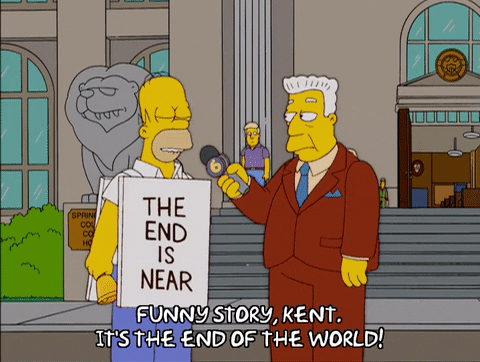
The Conservative Party have regularly been an instrument of death and destruction. This election might be the most important, because, due to the climate crisis, they could actually bring about the end of the world. Here’s why (the TL;DR version), with a more explanation of the points underneath.
- We are in an environmental epistemic danger zone.
- By this, I simply mean that we’re close to a big tipping point, after which there is no turning back, in terms of climate change. But we really don’t know just how close.
- In this type of danger zone, a major political effect which has causes our environmental situation – in terms of not solving global warming – to significantly worsen has a non-negligible chance of taking us past this turning point (i.e. guaranteeing the end of the world).
- Brexit is a major political event which will (or is very likely to) significantly worsen our global environmental situation.
- A Conservative government guarantees that Brexit occurs.
Conclusion: A Conservative government might literally end the world.
The argument looks valid (i.e. if those four claims are true, the conclusion is true). And I take it that the conclusion isn’t simply a meaningless hypothetical claim. This is the type of worry we should take seriously. Everything we understand about the planet in terms of the environmental mechanisms in play tells us that there are “tipping points”, and there will be a point at which there is no turning back. Because the feedback mechanisms operate over huge spans of time, and because these have a snowballing effect, at the point of no return it might still look like things are mostly fine (for most of us). The day we pass the point of no return won’t look like a Mad Max dystopia, but like a regular Tuesday, and, at the time, we won’t know. (Many of my slightly more cynical friends think we have already gone too far.)
So, we should really care about this. And I honestly think this argument should get more attention, because I think people do care about the end of the world. They just don’t see a connection between certain events (like letting the Conservatives in power again) and the end of the world.
In what follows, I’ll defend the four premises to my argument. I think the most contentious will be premise 3. Skip to that if you feel like it.
- The ‘epistemic danger zone’
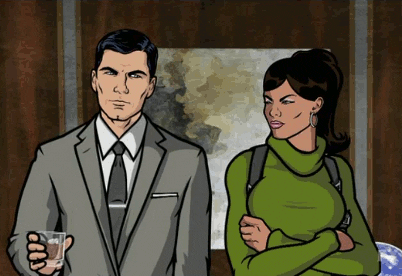
For non-philosophers, this “epistemic” just means to do with what we know. Why might I think we’re in a situation this bad? Well, because of all the science.
We do know that human action has had a significant effect on global warming.1 And we know that if we continue with greenhouse gas emissions at anything like the current rate, the world will, eventually, be uninhabitable.2 What we don’t know, is just how close we are. Many scientists now think the 2 degree above pre-industrial levels target from the Copenhagen Accords isn’t obtainable. That target was criticised as utterly inadequate, and many suggested that 1.5 degrees was needed to prevent many of the catastrophic effects, resulting in the Paris Agreement. Even if human-related emissions were reduced to zero immediately (which is, of course, not going to happen), this would only give us medium confidence of avoiding the 1.5 degree target. That 1.5 degree target was seen as dangerous to cross, and the 2 degree target considerably worse.
At 2 degrees the melting of ice sheets passes a tipping point, flooding many major cities. Many equatorial areas become too hot to live in, which will result in tens (or hundreds) of millions of climate refugees. At 3 or 4 degrees, things start to look apocalyptic.
But, recent models suggest that we might actually be looking at a rise considerably more. Some have predicted hitting four degrees by the end of the century. But, different models suggest very different things. A UN report suggested that even if countries adopted their nationally determined contributions in accordance with the Paris Agreement, we’d reach 3.2°C above pre-industrial levels by the end of the century (and given that a major contributor has already pulled out, even this looks ambitious). Earlier this week, we saw another stark warning that we may already have passed serious tipping points.
We know that we are ignorant about some things here. We don’t know which scenarios are more likely to obtain. Worryingly, predictions have become increasingly dire over recent decades. But we still don’t really know just how bad it is, and how far away we are from the point of no return. This is our danger zone.
2. Why an environmentally significant event is potentially world-ending
Hopefully, this should follow fairly easily from the previous point. Given that we could be very close to a point of no return, we can easily imagine that a big change could take us past that point. For small things, like lighting a candle, we can be pretty confident that this won’t be the straw that breaks the camels back. But something that is globally significant, in terms of our greenhouse gas emissions, could really be the end.
Frustratingly, I don’t think we can even estimate (reliably) how likely any given addition to our carbon footprint is to condemn us. We are ignorant about just how ignorant we are. Given that state of play, it looks like we should operate with what has been called a precautionary principle. Precautionary principles state that when we are ignorant about something, particularly something important, our focus should be on avoiding the negative consequence. If you’ve got reason to think that something might be a significant cause of cancer, for instance, and you don’t know how big the risk is, you probably want to avoid it. Given that the stakes are about as high as they could be in this case, if precaution is ever appropriate, surely this is a case where we need to be careful.
What kinds of events might fit this category – of significantly increasing the amount of greenhouse gases emitted? I think a second term for Trump is a serious contender, given his reckless attitude to climate change, and that America is already the second worst in terms of emissions in total, and third worst (behind Australia and Saudi Arabia) per capita. A climate change skeptic in charge in any very large country might spell doomsday. The election of Bolsonaro in Brazil was a serious blow on this front. Another candidate for this category would be a large-scale war. The Iraq war, for instance, had a significant carbon footprint, and Iraq isn’t exactly what we might consider to be one of the ‘big players’ on the world stage. Next, I’ll try to show that Brexit counts as one such event.
3. Why Brexit will (or is very likely to) significantly worsen the global environmental situation
If Brexit happens, several resulting mechanisms are likely to make the global emissions situation worse. I should note that while I think each of these mechanisms is likely to happen whoever is in charge of what kind of Brexit happens, some seem more likely if a Boris Johnson Brexit happens.
a) Loosening of domestic internal UK regulations
First, as several people have pointed out, Brexit is likely to hamper the UK’s handling of climate targets. This may happen due to abandoning policies, like a losing a precautionary principle required by the EU, that would no longer be required by British law. It also seems very plausible that Brexit, however it occurs, will require years of intensive trade negotiations. This is likely to serve as a distraction (as some have noted that it already has). Our politicians will be focused on these negotiations, which will be of crucial importance to the UK economy, but is likely to come at the cost of failing to pay attention to environmental issues.
We have already seen that UK governments have been happy to abandon green commitments – or “cut the green crap” – if they think something else is of political importance to them. With regards to the Conservative government, we have ample evidence that they don’t have a real commitment to the environment. Despite the last-minute temporary ban on fracking conveniently before the general election, I think you’d have to be extremely naive to trust them with the environment. Boris Johnson did little to assuage voters of this, by his not attending the climate debate ahead of the next general election – replaced instead by a melting ice statue of the world. How appropriate.
The UK is responsible for about 1% of world emissions currently. This is actually, per capita, much better than the vast majority of large nations. But this could easily get significantly worse. Importantly, this doesn’t take into account our carbon footprint from flights – either personal of for importing/exporting goods. The latter of these points, I come to next.
b) Import/Export habits changing in ways that emit more greenhouse gases
In the event of Brexit, we may import/export in ways that pollute considerably more. Rather than importing a large portion of our goods from Europe. About 53% of our imports and 44% of our exports currently go to our nearby neighbours.
Think about the trade partners a lot of the Brexit ringleaders have been touting. Often, we hear talk about reverting back to trading with commonwealth countries. Imagine we do successfully get great free trade deals with Australia, India and Canada. And we get that great trade deal that Trump wants with the UK. And these deals make up the vast majority of our imports and exports.
Given that the UK is still (for the time being) the fifth largest economy in the world, that the goods we buy and sell are likely to travel a lot further will have a big effect in terms of carbon footprint. Just how bad this could be will depend a lot on how good the deal the UK gets with the EU is. But presumably, any Brexit will mean we get a higher proportion of goods from further away, and also ship goods further away. Much of this will be via air, but even if via sea freight, this will have a significantly higher carbon cost than importing/exporting to, say, France.
c) Encouraging Big Polluters
Third, we will trade more with heavy polluting countries, making it more likely that they increase emissions even further. Why? Well, if, say, India, has an increased demand on many products, they will burn more fossil fuels to make those products. India already have the third biggest carbon footprint in terms of total emissions per country (rather than per capita). We would not be giving the Indian government any incentive to divest. And we will likely be desperate to trade with countries like India, to mitigate the negative effects predicted to result in the aftermath of Brexit. The British government will be in no position to ask other countries, kindly, to lower their emissions.
If we are going to trade more with the biggest polluting countries – China, the US, India – and increase their demand for products in the process, we do so at the risk of indirectly increasing their carbon footprints, which, particularly in the case of the US and China, are already egregious.
d) Loss of soft power
Finally, the UK is also likely to lose its ability to exercise soft power to convince other countries to adopt climate-friendly policies. Currently, the UK is actually a world leader on this issue. Granted, with an enormous coastline, ripe for windfarms and hydroelectric power, the UK is in a fantastic position to get a huge amount of its power from renewable sources. The UK was also, following the motion put forward by Jeremy Corbyn, the first to declare a climate emergency.
The UK is currently in a great position. The UK’s views are heard on the world stage. Exiting the EU puts this at jeopardy. As several have put it, Brexit threatens to turn Great Britain into Little England. This might be in terms not just of influence, but national status, as Brexit threatens the union of the UK, with Scottish Nationalists eager for independence, particularly if Brexit occurs.
This loss of soft power, a loss in the ability to influence other countries to act in ways we deem inappropriate, will render us less able to persuade other nations to adopt the required climate measures.
4. Brexit happens if Boris wins
This, again is fairly uncontentious. His slogan is “Let’s get Brexit done”. While I don’t trust most things that come out of his mouth, we can safely assume that Brexit does happen if Boris is in no.10 again after this general election.
Realistically, it looks like only two candidates might end up as Prime Minister in this election. It’s either Boris or Corbyn. Under Corbyn, we would have a second Brexit referendum, on the terms his government would negotiate. It is of course possible that the people of the UK would vote to leave once again. But, given what I have said here, a second referendum could be our only hope.
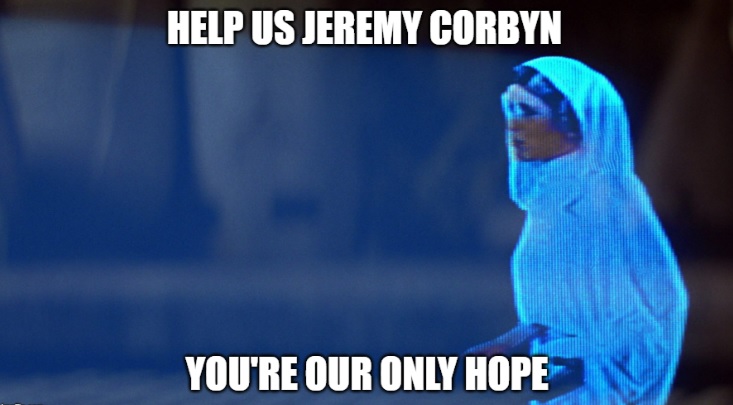
Conclusion
A Conservative government might actually end the world. With this in mind, if you like the world, y’know, having people on it, don’t vote Conservative. If you can, campaign against it.
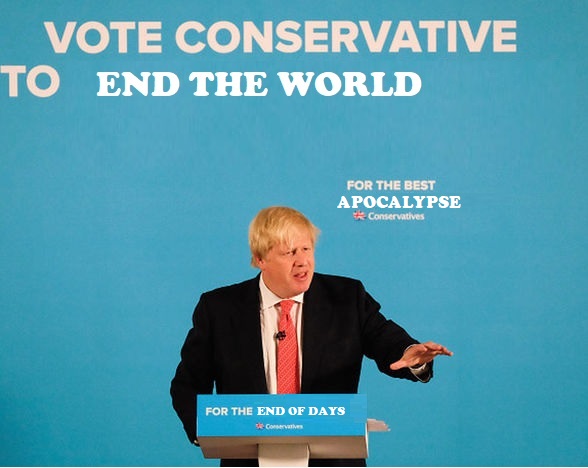
Endnotes:
- If you don’t accept even this claim, despite the consensus throughout the scientific community, I think you display a bizarre resilience to the powers of reason, and are probably beyond help. At very least I don’t think I could say anything to convince you.
- You might try to argue that even with the world burning, and largely uninhabitable, with certain scientific developments, we might still be able to maintain small communities of growing crops in highly-specialised facilities, or biodomes (or something else slightly science-fiction-y). I’m not going to dispute that, but I at least accept that this would also be a wildly undesirable consequence. While humanity wouldn’t be extinct in this kind of scenario (or if Elon Musk is successful in his planning trips to Mars), I’m happy to regard this as an end of the world situation.

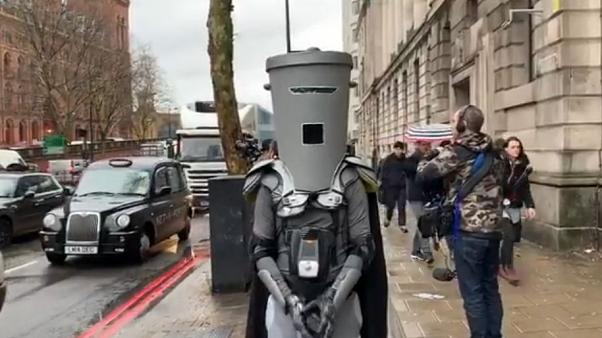
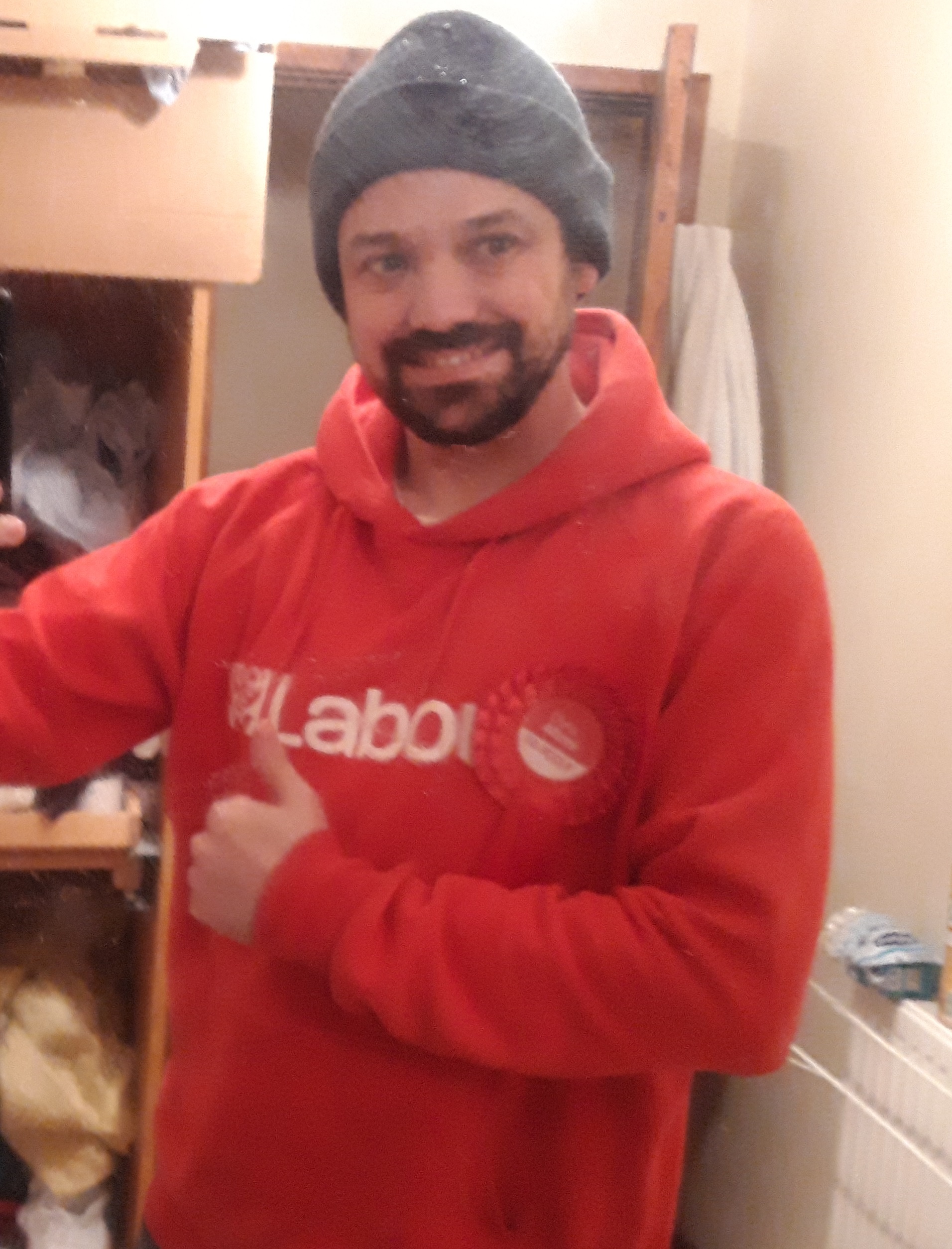
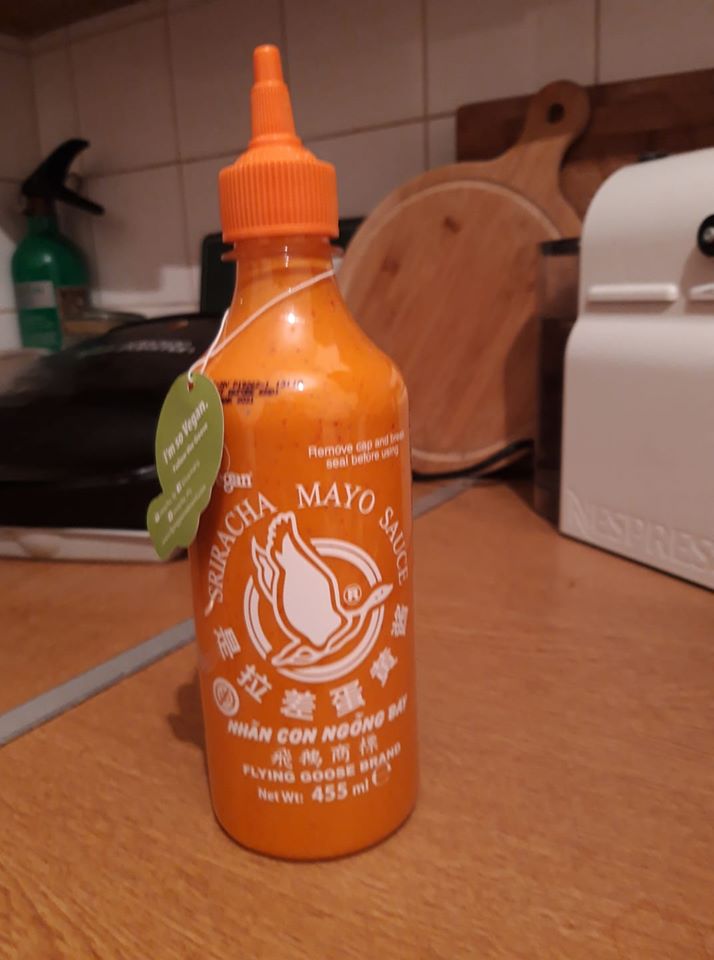
 Anyway, that’s all from me. Happy Friday all!
Anyway, that’s all from me. Happy Friday all!![20191205_123836[1]](https://joeslater.wordpress.com/wp-content/uploads/2019/12/20191205_1238361.jpg)
![20191205_142429[1].jpg](https://joeslater.wordpress.com/wp-content/uploads/2019/12/20191205_1424291.jpg?w=9216)
![20191205_110830[1]](https://joeslater.wordpress.com/wp-content/uploads/2019/12/20191205_1108301.jpg)



